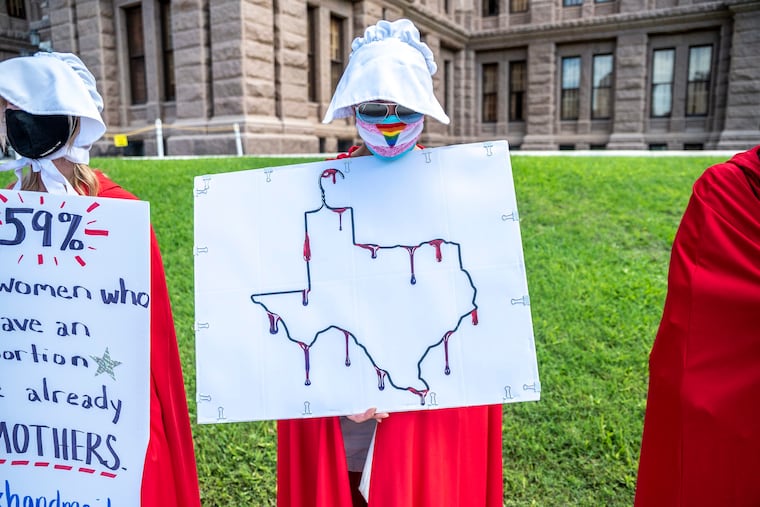A governor’s veto pen is the only thing standing between Pa. and Texas-style abortion laws | Opinion
Will a Texas-style law come to Pennsylvania? The appetite is there.

As the clock ticked toward midnight the night before Texas Senate Bill 8 was to go into effect, Texans in need of abortion care packed the waiting room of Whole Woman’s Health, a health-care facility that provides abortion care in Fort Worth.
Physicians saw as many patients as possible while waiting to hear if the U.S. Supreme Court would respond to an emergency request to block the bill. If not, most abortions would be banned the next day. A woman dropped to her knees, begging to see a doctor as protesters surrounded the clinic with blaring bullhorns.
The Texas legislation is a six-week abortion ban that relies on antiabortion activists instead of police for enforcement. It incentivizes vigilantes to compete for a “not less than” $10,000 bounty via civil litigation for turning in any doctor suspected of providing a banned abortion and anyone who “aids or abets” a person who has one.
The parameters of “aids or abets” could be broadly interpreted to apply to ride-share drivers, priests, advocates, lawyers, and philanthropists who donate to pro-choice organizations. Can you be sued for knowing someone who had an abortion and not stopping them? Perhaps it applies to the guy who impregnated the patient then didn’t take steps to stop the abortion. Reproductive control is an aspect of domestic abuse, and this bill encourages it. Senate Bill 8 isolates pregnant people at the moment they need support.
» READ MORE: Texas just enacted a law that promotes reproductive coercion. Pa. has to act now. | Opinion
As usual, the cruelty is the point. Texas lawmakers also, however, invented this Hunger Games-style system to avoid judicial scrutiny: Every six-week ban that’s gone to court before Senate Bill 8 has been ruled unconstitutional.
As midnight came and went without a response from the U.S. Supreme Court, antiabortion activists aimed “giant shining lights” at the clinic to let doctors and patients know they were already under surveillance.
As anyone who feverishly refreshed the homepage of the Supreme Court that night can tell you, it’s eerie to feel your rights being stripped away. After witnessing countless shrill and hostile antiabortion protests, and amid record-high levels of antiabortion harassment and violence, our rights simply vanished into the silent darkness of a long night.
The next night, the Supreme Court belatedly issued a 5-4 order declining to block Senate Bill 8. Chief Justice John Roberts sided with the liberal wing of the court and emphasized that this was a procedural ruling that does not mean the law is constitutional.
“The Court’s order is stunning,” began a ferocious dissent from Justice Sonia Sotomayor. “Presented with an application to enjoin a flagrantly unconstitutional law engineered to prohibit women from exercising their constitutional rights and evade judicial scrutiny, a majority of Justices have opted to bury their heads in the sand.”
Even before this nightmare in Texas, 2021 was already the worst year for abortion rights in history. A record-high number of abortion restrictions advanced through state legislatures by July. This fall, the U.S. Supreme Court will hear arguments in a case anticipated to further undermine, if not overturn, Roe v. Wade.
Will a Texas-style law come to Pennsylvania?
The appetite is there. This year, Pennsylvania’s legislative leaders have advanced three severe abortion restrictions — a creepy “fetal burial” mandate, a “reason ban,” and a six-week ban. Pennsylvania State Sen. Doug Mastriano, prime sponsor of the six-week abortion ban in the state Senate, is “very excited and happy” that the Supreme Court ignored the unconstitutionality of the Texas ban. He’s also likely running for Pennsylvania governor.
State Rep. Stephanie Borowicz, prime sponsor of the six-week ban in the House, says she’s not concerned with earthly obstacles such as a governor’s veto because she is “fully accountable to Almighty God.”
» READ MORE: The Justice Department says it will protect women seeking an abortion in Texas
Pennsylvania’s anti-choice activists are also “feeling pretty good” about bringing the Texas law here — provided, that is, Pennsylvania elects an anti-choice governor next year.
In the meantime, every day, young people, poor people, and people of color suffer under Pennsylvania’s already oppressive abortion laws, which mock the promise of equality in our state constitution. To what extent the Pennsylvania Constitution will turn out to be a shield against six-week bans and would-be citizen vigilantes is a story still being written.
For the immediate future, the distance between Pennsylvania and Texas is exactly the width of the governor’s veto pen. Whose hand gets to wield that veto pen after the federal right to abortion falls is a question that Pennsylvania voters will answer when they go to the polls in 2022.
The clock’s ticking.
Tara Murtha is the director of communications and Susan J. Frietsche is senior staff attorney at Women’s Law Project, a public interest legal organization devoted to defending and expanding the rights of women and LGBTQ+ people in Pennsylvania and beyond. @WomensLawProj.